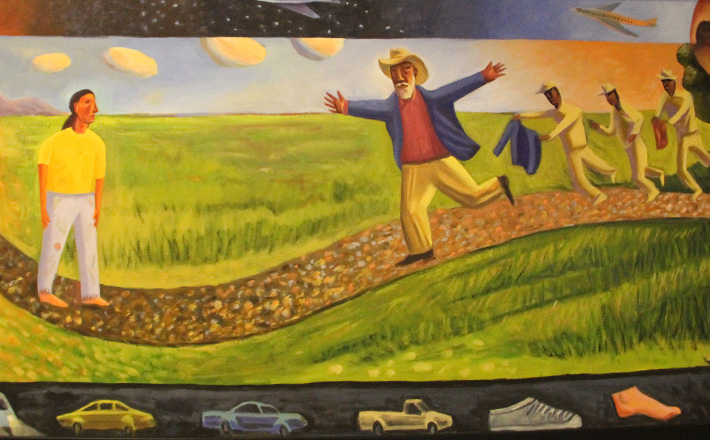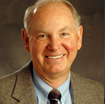Commentary on Acts 9:1-6 [7-20]
Saul: A Change of Plans
Each of Luke’s stories is particular. God is doing a new thing. Yet each story is God yet again making good on God’s promises. This story of Saul’s encounter with the risen Jesus on the way to Damascus was clearly a favorite of Luke, since he tells it three times in Acts (see Acts 22:6 -16; 26:12- 18). Like the series of speeches in Acts that repeat the same old story of salvation, the problem for the preacher is not the lack of material, but how to tell the whole story with the kind of imagination and vision that can capture and place our present stories within the grand story of God’s people from the beginning. As background for the lessons from Acts in the season of Easter it will be helpful to revisit the overview of Luke’s witness to the resurrection and the themes of Luke -Acts in my comments for the 2nd Sunday of Easter.
Luke is a master of narrative and of little words. As the story begins, an important word is “still” The resurrection has come, but Saul and the powers of evil are “still” at work and effective (9:1; Greek: eti). Saul has “official “letters” authorizing wholesale arrests of those who belong to “the Way” (9:2). Ironically, Saul is also “on the way” to Damascus and all signs point to his success.
And then “it happens!” (9:3; Greek: egeneto). This favorite word of Luke, often omitted in translations (see Luke 2:1; 24:4), signals the surprising entry of God into ordinary events. A light flashes “around” Saul and he wisely capitulates to the voice, that in the quick exchange twice identifies the object of Saul’s persecution as not Christians, but “me,” “Jesus” (9:4 5).
The command quickly cuts to the chase (9:6). “Get up and go into the city.” There is no argument or explanation, and one gets the sense objectives in Damascus will be changed. “And you will be told what it is necessary for you to do” (the original Greek). The “it is necessary” links this story to Luke’s common emphasis on the sure and certain destiny of God’s promise and mission (forty times in Luke-Acts; see Luke 4:43; Acts 1:16; 4:43; and last Sunday’s 5:29). Furthermore, that what is spoken will come from the outside and leaves no doubt that another is in control of Saul’s destiny.
To end the reading here leaves the story unfinished, with a “to be continued” that begs attention to the longer reading for the day. The repeated references in verses 7 -9 to opened eyes which see nothing and the mention of “three days” invite recollection and anticipation of the resurrection and of new beginnings, much as in the story of the Emmaus disciples in Luke 24.
Ananias: A Second Conversion
Now the story shifts to Damascus to a disciple named Ananias, and thus to one of Saul’s former targets. The close parallelisms of the accounts of Saul and Ananias suggest that there are really two call stories and thus, two conversions taking place here. To his obedient “Here I am, Lord,” Ananias receives the same cryptic “Get up and go,” but with explicit instructions regarding the object of his mission: Saul (9:11). When the voice adds reference to Saul’s “prayer” and vision of one coming to lay hands on him so that he can regain his sight, the narrative already anticipates the effective promises of God and invites us into a future that even Ananias is not quite ready to see.
Instead Ananias responds, “I have heard from many …how many evil things he has done.” Ananias knows too much about the ways of the world and about persons like Saul. Even after the reference to God’s “name” (9:14); even after the promise to Mary that with God “all words” are possible (Luke 1:37), the past still seeks to define and control the present. But in the promise of God’s word, then, as now, the ways of the world are being rearranged.
So the command needs repetition along with supporting rationale. “Go, because..” Because Saul is God’s chosen vessel who will carry God’s name. Surprise, surprise! Saul’s name will be added to the list of those who “call upon the name” and now will bear this name to strange places and to strange peoples like Gentiles and kings, and yes even to the children of Israel.
Three times the “name” is mentioned here, joined with talk of what Saul “must suffer for the sake of my name” (9:16). While perhaps suggesting Saul’s imitation of the suffering of Christ, the word “suffer” also implies one who is “passive” and no longer in control. In the promises of God things are set in motion that are out of our control. God chooses; God calls; God’s name is advanced as God does a new thing in light of the resurrection of Jesus.
So now Ananias obeys. He goes, enters, and lays hands on Saul. His address, “Brother Saul” is a telling sign of the new relationship underway in fulfillment of the promise. It is sealed in baptism as the sign of the Spirit’s presence and outpouring.
“For several days he was with the disciples in Damascus” (9:19). This concluding remark leaves much unspoken about the changes implied in the Damascan community of believers. One would like to know some of the dynamics that those “some days” with Saul entailed. Instead what we hear is that Saul “immediately” began to proclaim Jesus as the Son of God in the synagogues (9:20) Two relations, two communities, the new community of the disciples and the old community of the synagogue are both being transformed by this new preaching of Jesus as the risen Lord.
God Shapes a New Community
In this story a profound transformation takes place between Saul’s opening threats and his concluding preaching in the synagogues that Jesus is God’s Son. The two conversions are a vision, a sign, of how the name of the risen Lord takes shape and unfolds in the lives of believers, then and now. In this story disciples and non-disciples alike are swept up in the necessary plan of God’s design.
The story of Saul and Ananias invite us to ponder how we will look at our own world when God takes our “no way,” and our “we’ve never done that before” and transforms them into “yes.” Like Saul’s and Ananias’ new vision, God rearranges our ways of seeing, being, and acting. God changes our world.
It is not far from the Damascus road to Paul’s later word to the Romans about a “God who gives life to the dead and brings into existence the things that do not exist” (Romans 4:17). How do we imagine what God is doing? Where God is leading us? What will be our response when God says to us, “Get up and Go, because I have chosen you and am commissioning you for the life of a new community?”


April 18, 2010